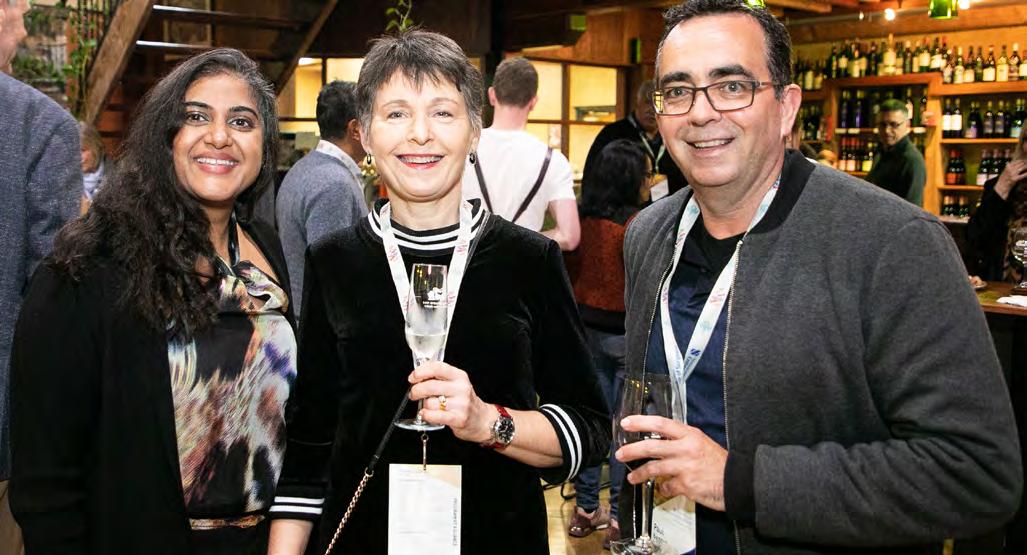
5 minute read
Annual scientific meetings - highlights
Tristate ASM: Associate Professor Mary Theophilus, Dr Cathy Ferguson and Dr Paul Bumbak
August was a busy month for many RACS state and territory offices, with several jurisdictions hosting their local annual scientific meetings (ASM). These meetings typically include a variety of high-quality presentations relevant to surgeons, irrespective of specialty. Equally important is the opportunity for participants to network with colleagues—often in pleasant surroundings. The College would like to thank the local chair conveners and staff who put a significant amount of effort into sorting through abstracts, lining up speakers of interest, finding sponsorship and ensuring the events ran smoothly. Below is a brief summary of the scientific meetings that were held across Australia.
Advertisement
South Australia, Western Australia, Northern Territory tristate ASM ‘Artificial Intelligence in Surgery - Superpower or Peril’? was the theme, as surgeons from South Australia, Western Australia, and the Northern Territory gathered in the Barossa Valley for the tristate scientific meeting. At the event, which took place from 25 to 27 August, RACS South Australia chair, Associate Professor Amal AmouHamden’s presentation provided a unique opportunity to explore the current use of artificial intelligence (AI) in surgery. This included the future of its integration in surgical practice, as well as an analysis of what has been learned from the implementation of past innovations. A common theme over the two days was that AI and other computer-aided technologies are transforming our surgical practice by augmenting human intelligence. This has the potential to replace the traditional human techniques in many surgical disciplines. However, as well as being revolutionary, change of this magnitude can also be disruptive and daunting, and there are many pitfalls that must be considered as part of this change process. Highlights of the conference included: - A presentation from South Australia’s chief scientist, Professor Caroline McMillen AO, discussing Machine Learning and advanced technological applications. - The Sir Henry Windsor Lecture delivered by inspirational surgeon Emeritus Professor Bill Gibson AO. Emeritus Professor Gibson is the founder and past director of The Sydney Cochlear Implant Centres (SCIC)—recently rebranded as Nextsense Cochlear Implant Centres. His moving presentation received a standing ovation and there were very few dry eyes left in the house. - An exploration of the links between AI in surgery and local industry, particularly the wine industry for which the region is famous.
- The Sir Henry Newland Award, which was presented at the conference dinner to distinguished South Australian surgeon, Dr Tim Proudman.
ACT ASM Artificial intelligence was also a strong theme throughout the ACT scientific meeting, which centred around the theme of ‘Role of the Surgeon into the Future’. In addition to this, the conference also explored the sub-themes of environmental stewardship and our climate change responsibilities within a clinical realm.
Throughout the day delegates examined the carbon footprint of the health sector in Australia, which accounts for seven per
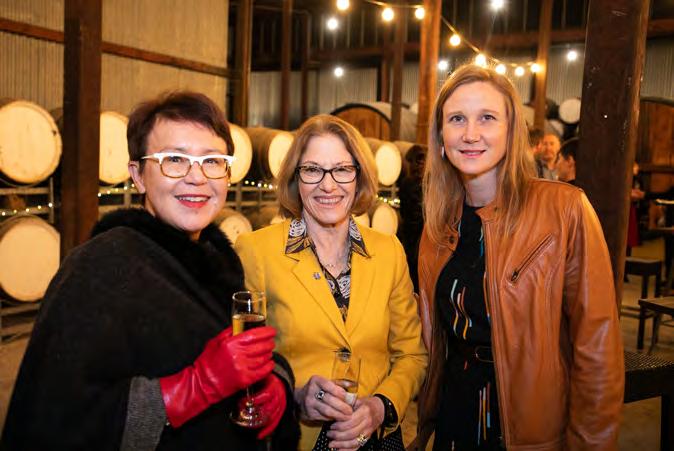
Tristate ASM: Professor Deborah Bailey, Mrs Jaqui Sparnon and Dr Rebecca Cooksey

Dr Sally Langley opening the ACT ASM Tristate ASM: Dr Michael Cusack, CMO, SA Health
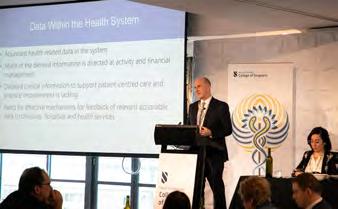
4
Tristate ASM: Associate Professor Amal Abou-Hamden with Maggie Beer
Dr Phillip Whiley presenting at ACT ASM
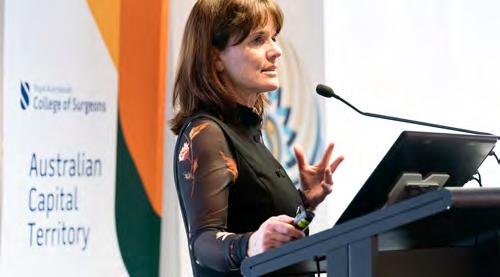
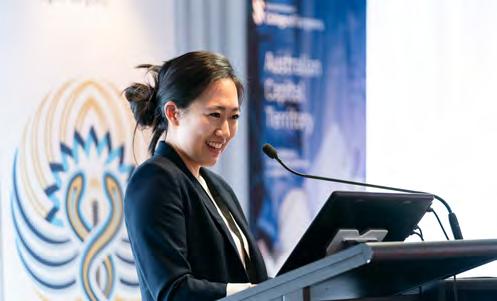
Dr Sharon Chih Lin Lee presenting at the ACT ASM


Dr Michelle Atkinson, orthopeadic surgeon and RACS NSW Chair presenting at the ACT ASM
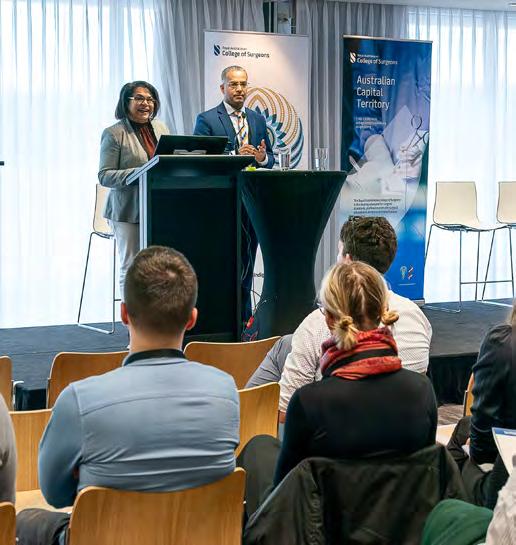
cent of our nationwide carbon emissions. It is estimated that hospitals contribute half of this and more specifically, the operating theatre generates up to 30 per cent of an institution’s waste. While this poses many challenges, the presenters throughout the day highlighted the opportunities this also poses to change behaviours and shape policies in surgical practice. In addition to the already high calibre of speakers, the line-up was further strengthened with the last-minute addition to the program of Senator David Pocock. He was elected in May as the first independent senator representing the ACT, where he ran on a largely pro-climate agenda. His presence at the meeting demonstrated a strong commitment to working with local surgeons and medical professionals to deliver practical solutions for health and the environment.
The 2022 meeting was a both an inperson and hybrid event as COVID-19 disruptions emerged. The event was well supported by the local membership with total participation over the day reaching 80 in person, with 31 delegates attending the event virtually.
Tasmanian ASM On Saturday 13 August 2022, the Tasmanian RACS State Committee hosted their ASM at Aura in Hobart. The theme of this year’s meeting was the ‘Humanitarian Surgeon’. We heard from exceptional speakers who gave their insight into providing surgical care in countries that have very limited resources. Clinical Professor Nitin Verma presented on the East Timor Humanitarian Service Provision and Dr Adam Mahoney spoke about the humanitarian experience with a military focus. Dr Billie Saykao gave an overview on the work she does with Care for Africa (with her counterpart Diana Butler zooming in from Tanzania at 4.00am) and Dr Gausihi Sivarajah shared stories of her incredible work in the South Pacific.
The meeting allowed the participants to consider the possible opportunities for humanitarian work and share their own experiences with their colleagues. The day was a huge success and on close of the meeting, participants reconvened at the Tasman Hotel, for a Foundation for Surgery dinner, raising much needed funds for the foundation.

Images (from top): Dr Adam Mahoney and Dr Billie Saykao.
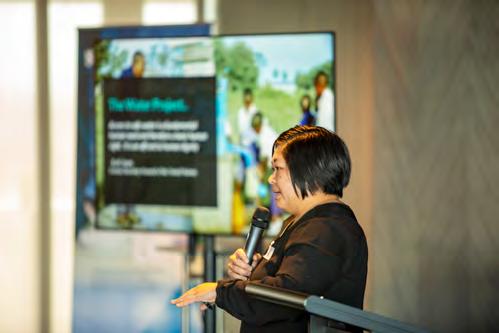
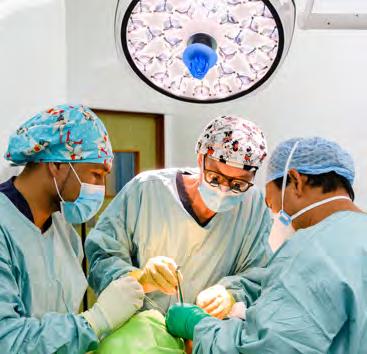
The easiest way you can support safe surgery today: share your thoughts!
Your views are important to us. You would have received a survey in your mailbox. The survey will only take a few minutes to complete, but will help make a lifetime of difference. So please, complete and return it using the reply-paid envelope, and show your support for accessible, safe, and quality surgical care today. Your feedback will help us improve and work harder than ever toward critical Indigenous health, global health, and research projects, now and into the future. For more information on the Foundation for Surgery, please visit surgeons.org/ foundation-for-surgery or email our team at foundation@surgeons.org.










